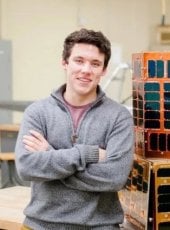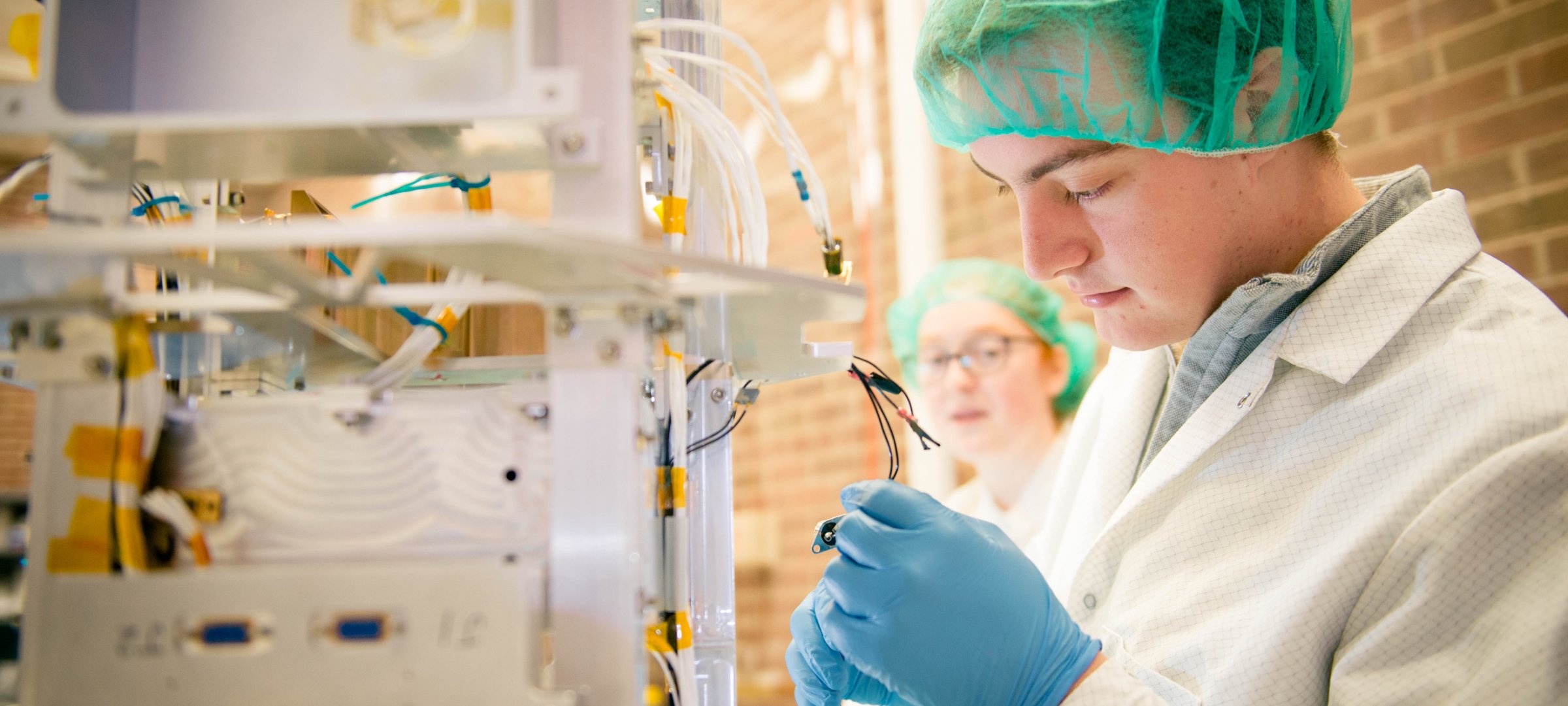Aerospace engineering focuses on the design, development, and testing of aircraft, spacecraft, and related systems. At Michigan Tech, use creative problem-solving and mechanical expertise to create out-of-this-world solutions.
A bachelor’s degree in aerospace engineering prepares you to create and test new technologies in aeronautics, astronautics, and avionics. Gain hands-on experience through collaborative coursework in structures, materials, gas dynamics, space science, and orbital mechanics. Study with our world-class faculty in innovative classrooms and labs where you learn by doing. Design, construct, and test real products—like the three satellites already built by Michigan Tech engineering students.
Request Information
Form loading . . .
At Michigan Tech, hands-on education is your way into the aerospace industry. In addition to your coursework, collaborate with our industry-proven faculty on research projects for the Michigan Tech Aerospace Engineering Research Center (MARC), develop solutions for exploration in the Planetary Surface Technology Development Lab (PSTDL), or study next-generation thruster systems in the Ion Space Propulsion Lab. Collaborate with your fellow engineers in the Engineering Learning Center or in professional organizations such as the American Institute of Aeronautics and Astronautics.
No. 17
No. 14
Top 20
No. 13
What Will I Study?
As an aerospace engineering major at Michigan Tech, you'll build on a foundation of physics, mathematics, and engineering principles. Develop hands-on expertise working on real aircraft, spacecraft, and aeronautical technology in our state-of-the-art facilities.
Before you graduate, begin production of your big ideas by participating in Senior Design, a capstone course where you can develop, design, and test your own working prototype to meet project needs. Expand your expertise with advanced coursework in the following areas:
- Fuel Cell Technology
- Aerospace Propulsion
- Dynamic System Simulation
- Computational Fluids Engineering
- Aerodynamics
- Compressible Flow
Tomorrow Needs Aerospace Engineers
As an aerospace engineer, you will design, develop, and test aircraft, spacecraft, satellites, and other technologies. You will create and test prototypes—focusing in areas like aerodynamic fluid flow, structural design, navigation and control, and propulsion and combustion.
Your work as an aerospace engineer can vary from project to project and may include:
- Coordinating and directing the design, manufacture, and testing of aircraft and aerospace products
- Assessing project proposals to determine whether they are technically and financially feasible
- Evaluating designs to ensure that products meet engineering principles, customer requirements, and environmental regulations
- Developing criteria for design, quality, completion, and sustainment after delivery
- Inspecting malfunctioning or damaged products to identify sources of problems and possible solutions
At Michigan Tech, our strong industry partnerships and programs make all the difference. Collaborate with industry on real engineering problems through our Enterprise Program and Senior Design course. Distinguish yourself with industry co-ops and internships. Employers will value your ability to perform on the job from day one.
Engineering Enterprise Concentration
You can pursue an Enterprise concentration by taking part in Michigan Tech's award-winning Enterprise Program. Work on real projects, with real clients, in an environment that’s more like a business than a classroom. Choose from among 26 Enterprise teams on campus to invent products, provide services, and pioneer solutions. All Enterprise teams are open to all majors, including aerospace-specific teams like the Aerospace Enterprise, Aeronautics and Rocketry Enterprise, or Multiplanetary Innovation Enterprise. Tackle real-world design projects for industry sponsors or take part in a national competition (or both). This concentration can add courses in business and entrepreneurship.
Get Career Ready
Graduate with a bachelor's degree in aerospace engineering from Michigan Tech. You will be well prepared to transition to an entry-level job in industry. For students who plan to pursue an advanced degree—desirable for mechanical engineering research positions—our bachelor's degree also provides excellent preparation for graduate school.
Explore Career Opportunities for Aerospace Engineers:
- Aerospace Engineer
- Aeronautical Engineer
- Astronautics Engineer
- Avionics Engineer
- Aircraft Designer
- Spacecraft Designer
- Inspector and Compliance Officer
- Flight Test Engineering
"Michigan Tech has a really unique educational structure: it's hands-on, not hand-holding."



